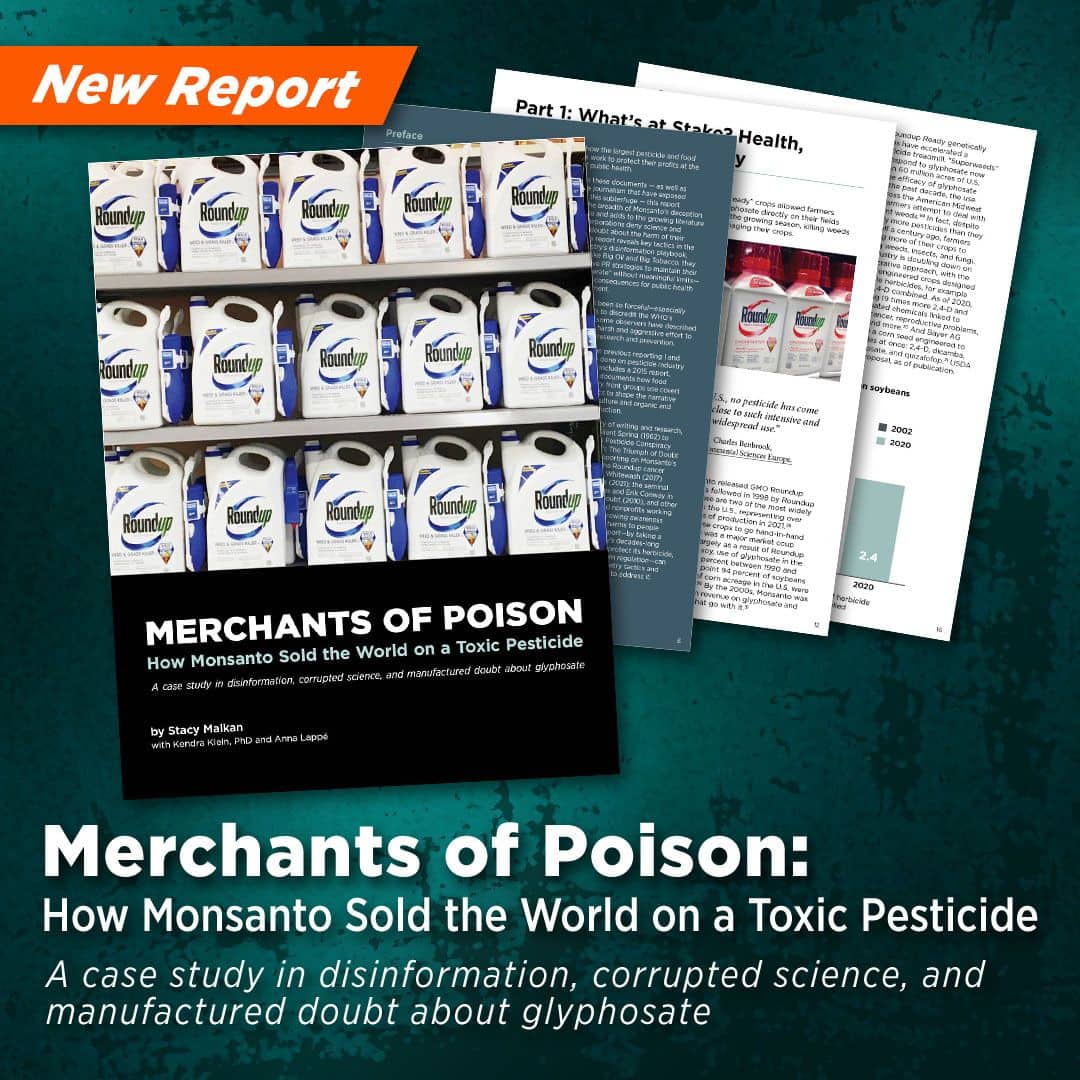Sign up for our free weekly newsletter
Merchants of Poison: How Monsanto Sold the World on a Toxic Pesticide, a new report by Stacy Malkan with Kendra Klein, PhD, and Anna Lappé, provides a rare look inside the disinformation and science denial efforts at the core of the pesticide industry’s public relations playbook. Focusing on the herbicide glyphosate (known by its brand name Roundup) as a case study, this is the first comprehensive review of Monsanto’s product defense strategy, including the tactics used to manipulate science, attack scientists and journalists, and influence regulatory agencies to protect profits from glyphosate, the world’s most widely used herbicide.
The report also names the astroturf operations, front groups, professors, journalists, and other third-party allies Monsanto (now owned by Bayer) relied on to defend glyphosate, despite decades of science linking the toxic chemical to cancer, reproductive impacts, and other health concerns.
The analysis draws from thousands of pages of internal corporate documents released during lawsuits brought by farmers, groundskeepers, and everyday gardeners suing Monsanto over allegations that exposure to Roundup caused them to develop cancer; as well as documents obtained through public records requests in a years-long investigation by U.S. Right to Know, a public interest research group.
Read excerpts from the report here:
- Pesticide industry disinformation: What’s at stake? Health, climate, biodiversity
- Tactic 1: Manipulating science: What the documents reveal about scientific misconduct
- Tactic 2: Co-opting academia: How academics and universities came to Monsanto’s aid
- Tactic 3: Mobilizing third-party allies: Meet the Merchants of Poison
- Tactic 4: Tracking and attacking critics: Bayer-led attacks on scientists
- Tactic 5: Weaponizing the web: How pesticide groups dominate Google News searches

“The pesticide industry is not just following in the footsteps of Big Tobacco and Big Oil, they co-wrote the playbook — from their attacks on Silent Spring author Rachel Carson 60 years ago to the recent Monsanto-led assault on the cancer researchers of the World Health Organization,” said Stacy Malkan, lead author of the report and co-founder of U.S. Right to Know.
“This case study provides an important window into how one company worked with many partners across the pesticide and processed food industries, academia, PR firms, and various front groups to sell the world on a toxic pesticide. These disinformation tactics are critical to understand because they have been used to push the entwined myths that we need pesticides to ‘feed the world’ and that they are totally safe,” said best-selling author and advocate Anna Lappé who contributed to the report.
Key takeaways:
- Monsanto employees ghostwrote scientific papers about glyphosate and strategized to discredit scientists and journalists who raised concerns about the pesticide.
- UC Davis, University of Florida and other public universities played a significant role in legitimizing and amplifying pesticide industry product-defense efforts.
- Prestigious foundations and scientific groups provided PR help to pesticide companies, including The Bill & Melinda Gates Foundation and the American Academy for the Advancement of Science, one of the world’s most prestigious scientific organizations.
- Key front groups that led attacks on scientists and journalists (Genetic Literacy Project and American Council on Science and Health) frequently push industry messaging to the top of Google News.
The report also documents that pesticide industry propaganda is a huge business:
- Seven front groups named in Monsanto’s documents spent $76 million in a five-year period pushing corporate disinformation, including attacks on scientists.
- Six industry trade groups named in Monsanto’s documents spent more than $1.3 billion over the same five years, including for PR and lobbying to influence regulation over glyphosate.
“Pesticide companies fight tooth and nail to keep their toxic products on the market, and the public pays for their deceit with our health and our lives,” said Kendra Klein, PhD, deputy director of science with Friends of the Earth who also contributed to the report. “Meanwhile, the rampant use of toxic pesticides is unraveling the web of life as bees, birds, and other critical biodiversity face increasing threats of extinction. The ‘silent spring’ that Rachel Carson warned of six decades ago is here.”
Coverage of the report:
Russell Brand interview with Stacy Malkan (2.16.233)
Op-ed: What the pesticide industry doesn’t want you to know: Confronting pesticide industry science denialism, by Stacy Malkan, Kendra Klein, Anna Lappé, Environmental Health News (12.12.22)
5 ways the pesticide industry is lying to you, by Kendra Klein, PhD, Medium (12.5.22)
Pesticide industry ‘helped write’ disinformation playbook used by Big Oil and Big Tobacco, report reveals, by Dana Drugmand, DeSmog (12.9.23)
Weekend reading: Monsanto, by Marion Nestle, Food Politics blog (12.16.23)
Washington Post / Bayer alliance undermines trust in science, by Stacy Malkan, Capitol Hill Citizen (1.23)
Aim for the Stomach Why the threat to food supplies—and industrial agriculture’s role in global warming—is central to the discourse on climate change, by Mark Schapiro, Mother Jones (2.2.23)
About the author:
Stacy Malkan is the co-founder and managing editor of U.S. Right to Know, a non-profit research group whose investigation of the pesticide industry informs this report.
Additional collaborators: Kendra Klein, PhD is Deputy Director of Science with Friends of the Earth. Dr. Klein provided support on the state of the science on pesticides and their impacts on ecosystems and public health. Anna Lappé is an author and sustainability advocate who provided editorial, writing, and research support and a strategic advisor to Real Food Media.
About the groups: U.S. Right to Know is a nonprofit investigative research group promoting transparency for public health. We uncover, report on and publish documents obtained by public records laws, whistleblowers and litigation that expose corporate wrongdoing or government failures that threaten our health, our environment and our food system.
Friends of the Earth fights to create a more healthy and just world. Our current campaigns focus on promoting clean energy and solutions to climate change, ensuring the food we eat and products we use are safe and sustainable, and protecting marine ecosystems and the people who live and work near them.
# # #









